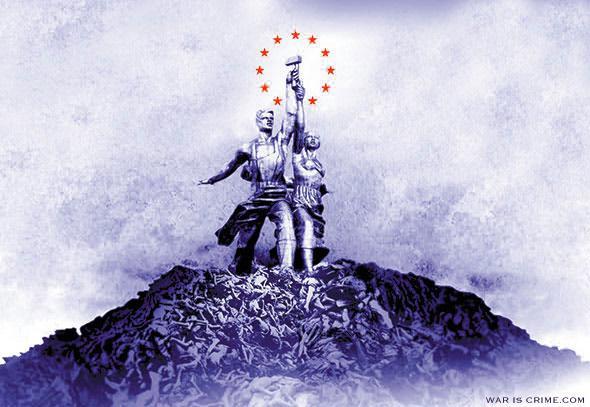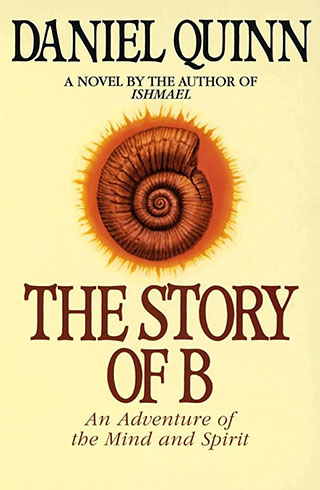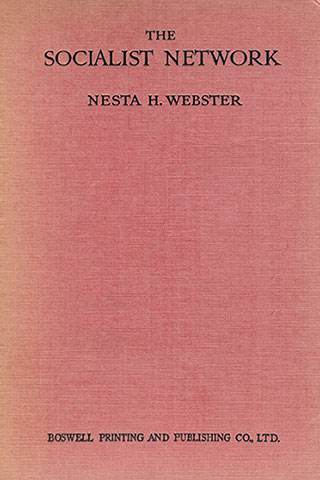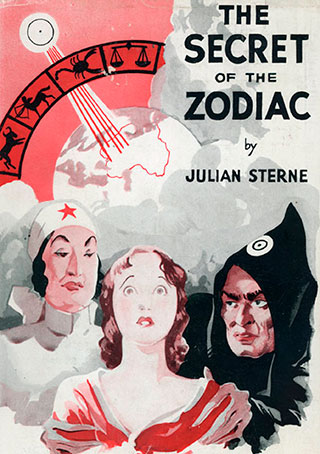Soviet Roots of the Socialist European Union

Back in 1985 I wrote a book called The Ark of Apocalypse, and sub-titled it “A fiction story of the future — I think”. I believed that based on true and approved prophecy and the trends in the world, I could figure out where the world was headed and how. I saw it heading to total economic disaster, starting in Europe, which was becoming more and more socialistic. I envisioned (without hard evidence) the Communist Politburo in Moscow financing and directing a gradual infiltration of Western European governments making them more and more socialistic to the point of no return. The more a government gives you the more it owns you. This was happening all over Europe and seemed to have some kind of master plan.
To some people, the USSR was a communist success, but I knew better. It seemed to be successful, because it kept expanding. Let me explain it this way. If you have a business that gets paid up front 50% before starting work on each contract, you suddenly have money in your pocket. But if at the end of that project you loose 20% you will go broke. If, however, half way through that contract you sign another contract that will bring you the same loss and get another 50% cash up front, you still seem to be successful, because you have 100% less 20% of other people’s money. As long as you keep expanding, you do not see what a failure you are. In the 75 years of Russia’s expansion they did not see what a real failure they were. But in 1985 they began to see that the entire system was going to fail. This was when Gorbachev took office and when I had already finished my book. Quickly Communism in Russia seemed to fall apart and I began to think I was wrong about my book and never published it. I kept trying to re-write it, but things kept changing so fast I just gave up.
I just read a small booklet by Vladimir Bukovsky called EUSSR: The Soviet Roots of European Integration, exposing secret documents of the Politburo in Moscow and I now know that I was right in the first place. My original book was more exact than the re-written versions. To explain this, we must go back into history a little bit.
The 1914 Communist Split
In 1914, Socialists split into Bolsheviks (communists) and Mensheviks (socialists). The Marxist ideology was the same, but they differed on methods of achieving the goal. The communists took control by force and the socialists used the democratic systems to gain power. For 70 years they were antagonistic toward each other.
It was in the late 1970s and early 1980s that both sides had to re-consider this hostile attitude towards each other and try to work together. In 1981, Communist Mitterrand became President and began to introduce socialism in France. In just a few years, Mitterrand’s socialism almost destroyed the economic system of France and, like all socialist countries, it headed for complete collapse.
Russia was on the brink of economic disaster, because it was no longer expanding, Ronald Reagan was pushing them to more and more military spending that they could not afford and the entire system was about to collapse. Now both the Bolsheviks and the Mensheviks had to re-think their style of communism.
“The Soviet economic model, unproductive and wasteful by definition like all socialist models, had brought them to the brink of bankruptcy. On the other, their very ‘success’ in exporting that model to other countries was becoming an unbearable burden to carry on their shoulders. With their troops bogged down in Afghanistan, and with the Polish crisis looming large on their doorstep, the ‘cost of Empire’ became virtually unsustainable. Simply put, they had suddenly realized that their economic base was too small for their global ambitions. Added to that a new round of the arms race forced on them by Ronald Reagan, falling oil prices and a growing discontent at home, and one could understand their sudden urge for reforms. A final blow came with Reagan’s obsession with the ‘Star Wars’ project. Americans might have been bluffing, but the Soviets had to follow suit regardless, trying to compete in the very sphere where they were most behind the West — hi-tech. The only way to modernize the Soviet economy was to use the ‘class enemy’s’ technological potential.”[1]
Perestroika
On March 26, 1987 Gorbachev and the Politburo saw that they had to unite the Bolsheviks and the Mensheviks and both sides had to compromise their methods because both were loosing ground fast. Gorbachev believed that the Mensheviks had to become more aggressive in government control and less democracy and mapped out a plan to do just that. On the other hand, the Bolsheviks had to become more like the Bolsheviks and give up more control to the masses and to the productive businesses. For this objective, Gorbachev started having secret meetings with the socialists of Western Europe and international Socialist organizations like the Trilateral Commission.
In these secret meetings (transcripts of which are in Vladimir Bukovsky’s booklet) Gorbachev and the Politburo came up with Perestroika for the Soviets to become more like Western Socialists. But the failure of Western Socialists was their lack of central control and their inability to constantly grow, which is the failure of all Socialism. To find a solution to both the Western weakness and the East’s weakness the secret meetings came up with a new policy called the “Common European Home”. At that Politburo meeting, “Common European Home” was given the highest priority. Having a plan for the Western Socialists and the Eastern Communists required that both work to help each other. It meant to bring together all the West and the East in a common EAST WEST GOVERNMENT, but little by little so that the principle of constant expansion could apply and not let what happened to Mitterrand’s France happen to Europe as a whole.
The plan was to get rid of NATO and push America out of Europe and unit Europe in the West, expand to the East, and eventually to Russia. To accomplish this they met with the Trilateral Commission on January 28, 1989. Gorbachev, Rockefeller, Kissinger, Nacasone and Giscard d’Estaing worked out how the Soviets could integrate into the world’s economic and financial institutions (e.g., GATT, IMF) and how to convert the ruble into world markets. Again, on April 4, 1990, another secret meeting of the Trilateral Commission took place with the Politburo. On October 25, 1990, Gorbachev met with Argentinean Socialist President Carlos Menem to build further cooperation after the unification of Socialist Europe. And Menem bragged that this new strategy could take the universe.
You would think that they would be on the run since the collapse of USSR was already in progress. Czechoslovakia opted out of a socialist future, Poland had elected its first post-communist government, Baltic states were pushing for complete independence, and in the German elections the social democrats were utterly defeated. The future was bleak for Gorbachev, and Western partners could offer him little help in practical terms. But his plans were bigger than Russia or the USSR.
Yeltsin Destroyed USSR, and not Perestroika
Perestroika was intended to change the political situation in Western countries rather than in the USSR. It was “to allow socialism to get involved in shaping the world politics more actively and more widely, to influence it more effectively and to stimulate positive changes in the surrounding world.”
Part of his plan to appear more western was to have democratic elections in the different states of the USSR, but leaving Gorbachev as the head of all the states, the President of the USSR. For this reason, he had elections, and Yeltsin became to first elected president of Russia on June 12, 1991. The following month, July 29, 1991, Gorbachev, Yeltsin and Nazarbayev agreed to the Union Treaty and to fire the head of the KGB, the Defense Minister and the Prime Minister who were not in favor of Gorbachev’s compromising with Western Socialists. However, the KGB had secret microphones in the room.
On August 18, 1991, the KGB tried to overthrow President Gorbachev. Three days later, Yeltsin rallied the people all over Russia and forced the KGB to surrender; two committed suicide. The main army of Russia went on the side of Yeltsin. Without the KGB and with the army on his side, Yeltsin became the power of Russia, and not Gorbachev. On December 8, 1991, Yeltsin banned the Communist party, formed the Commonwealth of Independent States. On December 24, 1991, Yeltsin banned the USSR putting USSR President Gorbachev out of a job. Gorbachev was out and Yeltsin was in.
Communism Moves From Russia to Europe
Gorbachev was out in Russia, but he had new Western friends. They first gave credit to Gorbachev for the fall of the USSR, and I fell for that. He formed his own organization to further his plans made in 1987 for a Socialist united single government of all Europe and Russia pushing America back to their own contenent. These plans went on as if nothing happened to Russia.
Only 46 days after Gorbachev resigned from the now defunct USSR, the Maastricht Treaty was signed. This is the treaty that created the European Union and led to the creation of the EU, the Euro, the Common Foreign and Security Policy, EU justice, EU home affairs, and EU Political Cooperation. Sever years later, on May 1, 1999 (Commuist May Day), the Amsterdam Treaty came into effect and expanded EU in Social internal matters. And just like the Politburo plans of 1987, on February 6, 2001, The Treaty of Nice was signed, which expanded the EU to Eastern Europe.
Is The European Union Communist?
According to Christopher Booker and Richard North’s book, The Great Deception, the EC is communist. Who wrote the constitution of EU? No one knows. Members of the EU commission are not elected by the people, but appointed. Even the good members complain that they get documents they do not have time to read, do not know who wrote them, and are asked to vote on them. Most of the EC countries will not vote on ratification but only the governments will ratify
them. Given to the people, it would never pass as shone by France’s rejection, the one country no one expected to reject it.
The object of the EU, according to The Great Deception, is to get America out of Europe.
“… The consistent ambition of the Soviets, and the many Communist parties subservient to them, and fellow-traveling Socialists as well, was to weaken the American presence, and, if possible, remove it altogether from the continent. One way or another, the EU has taken up where the Soviets left off, and is proving more successful: look at the doubtful future of NATO, the growing European army, the relocation of American troops and bases out of Germany, Franco-German efforts to stymie the United States over Iraq, the lifting of the arms embargo on China, uncritical sponsorship of the PLO, and much else besides…”[2]
And, according to Vladimir Bukovsky:
“Indeed, trying to build socialism just in one, ‘separately taken’, country one would face a very unpleasant choice. If you keep building socialism you lose competitiveness. If you take care of competitiveness, you have no socialism. You cannot combine these two things, even armed cordons along the borders and other kinds of iron curtains do not help. The only solution is to impose socialism on your competitors as well.
The progressive solutions in the social sphere must fit in the European framework. In one country, even the most interesting solutions would give only partial results.
The new attitude of the Left to European integration was pre-determined by this very consideration. This attitude used to be cold, if not worse, for many decades, but now they realized that integration was about the only way to salvation. Many years of their struggle for power in independent European countries proved fruitless. The only thing left to do was to try to seize control over the whole of Europe at once.
Certainly, speaking of democracy, communists always mean ‘social democracy’, while ‘truthful information’ in their parlor had always been an euphemism for communist propaganda. That is what they hoped would prevail in an united Europe.
However, it was not enough to hope, they had to act. The power over Europe would not come to the communists by itself, they had to fight for it.
Therefore, one thing was clear enough. It was necessary to unite all the left: communists, social democrats and anyone else who would support the socialist agenda.”
Why a Common European Currency — the Euro?
Compared to the leaders of the republics, Gorbachev had one apparent advantage: world’s best specialists of forcing such communities and unions were at his service. From them, he knew all the niceties of this little-known craft.
For example, he knew that the most important thing is single currency, and everything else will imminently follow. Without a single currency, single economic policy is impossible. Therefore, the states are not independent, and all their declarations of sovereignties worth nothing. Whatever is declared, a single currency will inevitably lead to single constitution and single statehood.
The Common Market of 12 EEC countries exists since 1957, French minister of economy Pierre Beregovoy enlightened Gorbachev. In the last few years, we are going along the path of hastened economic integration. We are going to have single currency, or at least common currency, as early as by the end of this century.
Please note, the idea that people might vote against this did not even cross Beregovoy’s mind. There is not such thing as people’s will in the socialist schemes. What is called by this name is something completely different.
The West was to help Gorbachev to convert the ruble. And even if other currencies appear, they will remain unconvertible. Hence, they will be closely connected to the strong ruble anyway. But, given the convertible ruble, hardly anyone would ever want to have a separate unconvertible currency.
As far as republican currencies are concerned, Gorbachev told Beregovoy, there are indeed some talks about this. But I suppose, there will be no need for the republics to introduce their own currencies, if we, in cooperation with the West, solve the problem of ruble’s convertibility. Anyway, I suppose that ruble will play a leading role, given the scale and importance of such a republic as Russia.
In order to have common approaches to our relations with foreign enterprises and corporations, we are going to conduct close coordination of foreign policy, including foreign economic policy, in the framework of the Union. More than that, we are thinking about creating a Central reserve system on the basis of central banks [of the republics].
M. S. Gorbachev added:
… The economic treaty will contain … principles of common policy in the areas of taxation, banking, social problems, and others. Our economists believe that emergence of national currencies will not cause serious problems. All the more so that the solution of ruble’s convertibility problem will lead to decline of agitation. I’d like to notice that, for example, Estonia shows its interest in common economic zone. This means that even in the Baltic region they do understand how to live [in reality].”
Will a Common Socialist Europe Succeed or Fail?
It will fail. Already France and Holland have voted against the Constitution, Germany may throw out the Socialists in the next election, Spain will do the same and maybe before an election. Portugal is on the brink of bankruptcy and a social revolution, and adopting an isolation attitude making it almost impossible for foreign investment. The Portuguese are leaving because of a lack of jobs or poor pay. They should have done what Ireland did in the beginning.
Ireland came from a very poor nation to a very prosperous nation in a short time by doing all the right things. They realized that wealth is created by business, so they made incentives to bring in large businesses from all over the world — cheap property and rent, no red tape, low utility bills and cheap, well-educated labor. It worked. This is called “Supply Side Economics”. Then Ireland did a stupid thing. They joined the EU and adopted the Euro and Socialism. Taxes have gone up so fast that the cost of living is one of the highest in all of Europe making it almost impossible to save money or plan for a future.
All the Western European countries are bringing in the cheap labor from Eastern Europe in spite of high unemployment in Germany, France and Portugal. Not only labor, but prostitution by the tens of thousands. England is ready to pull out, Poland is always antagonistic to the lack of God mentioned in the constitution, and Italy is ready to chuck the Euro. Becoming more capitalistic has resurrected China for the short term but 10% of the people have 45% of the wealth and this is normal for communism. Unrest with the people will bring China down also. The West could help, but cave into the low labor products and greed.
I am hoping that this exposure of these secret meeting with the Soviets creating the EU may push the whole thing to an end. This end may be very painful for Europe as many counties may go down for the count and economies may completely crash.
Why No God in European Constitution?
In spite of the majority of Europe wanting a mention of its Christian roots and pressure from John Paul II and the bishops throughout Europe, the writers of the Constitution refused to add any mention of Christianity. This did not make any sense until you see that the very reason for the Constitution is to make Europe into a communist style of socialism.
Armed with this new information, the new Pope and the Catholic Church should go to war with the European Union in the same way John Paul II went to war against Communism in the East. All Catholics should recognize that we are in a war. It may be different in America and different still in China, and again in Islamic countries, but it is war and mostly it is governments fighting to make God a thing of the past.
Promise and Truth
“They are telling us now that one of the reasons we need such an European superstate is to avoid war in Europe. … We are told that it is necessary for us to suppress our ethnicity, our nationality, our prejudices, our traditions, and then we would be living as multi-national communities happily ever after. We can tell you in advance, the opposite is going to happen.
After seventy three years of living in the Soviet Union which was supposed to be a happy family of nations, we had so much ethnic conflicts that no other country could produce. Look at former Yugoslavia, which also claimed to be one happy family of nations under socialism.
We are told today that the aim of the EU is to become prosperous. Our economy will be capable of competing with the United States thus enabling Europe to stand up for its interests. The opposite will happen. Over-regulated, over-bureaucratised, the over-taxed economy of the European Union will become very weak, nations of Europe will become more and more poor and more and more looking up to the United States. But one doubts that the US will once again be in a position to save Europe with another Marshall Plan.
They are telling us that the peoples of the EU will enjoy unprecedented freedom and human rights. They are lying for they began by depriving us of the most basic right — a right to elect by direct ballot those who govern us.
We do not elect those People’s Commissars who govern the EU. And this is just a beginning. What about that sinister Europol, or Eurojust with its ‘European arrest warrant’, its diplomatic immunity and a power to prosecute the ill-defined crimes of ‘racism’ and ‘xenophobia’?
One wonders how many former East German Stasi officers, or their colleagues from other East European countries, will end up working there. Judging by the example of the latest Commission, which had 7 former communist ‘apparatchiks’ out of 25 Commissioners, we might have up to one-third of them.
If we learned anything from the lessons of the last century, it must be a notion that every utopia ends up in a GULAG of its own. And it just remains to be seen what kind of a GULAG will the EU create.”
What Should We Do
What can we do to stop a Communist takeover of Europe and should we? Maybe we should let Europe die and have its economic crash. Why should we care? The problem is that Europe is the father of the United States, Canada, Mexico, and all of South and North America. Europe is the father of many Pacific and Asian countries and has roots all over the world. Just like America, an economic crash of Europe will affect the entire world. I actually predicted this in the book I wrote before 1985 and still believe it could happen. It could be avoided however.
First, we should show everyone we can, especially Western politicians, the Communist roots of the European Union and the Euro. We should then offer Eastern and Western European nations an alternate economic union. The ideal way to block the goals of Communists is for America to make separate economic deals with Eastern European countries, putting a split between Russia and Western Europe. Poland would welcome this right now. Having a Polish nation under a market system while the other nations are under a socialist system will be like the former East and West Berlin, a beacon of light in the darkness.
In the West, already Italy, Danmark, Ireland, and Britain would jump at this alternate economic union, thus burying the ambitious plans of European socialists.
Right now it seems that the USA is blind to the real threat of this EU. A complete re-thinking of the European policy is urgently needed.
“It requires a vigorous performance and a clear vision that anything less will doom Europe to yet another ideological nightmare from which the US might not be able to bail it out this time around”.
“But this suggestion is not as radical as it may sound. United States is already reviewing its transatlantic policies by moving NATO bases further to the East and therefore re-configuring the alliance. Just make one step further and millions of people here will be eternally grateful to the United States for saving them from this remnant of the Cold War called European Union“.[3]
Or should we say the Union of Socialist Republics in the West.
Our Lady of Fatima said, “Russia will spread her errors throughout the world.” Russia is still doing it.
references
[1] Vladimir Bukovsky’s pamphlet, EUSSR: The Soviet Roots of European Integration.
[2] The Great Deception, by Christopher Booker and Richard North.
[3] Vladimir Bukovsky’s pamphlet, EUSSR: The Soviet Roots of European Integration.
The secret archives of Politburo in Moscow. Archive of Gorbachev Foundation (Inventories 1-1, 2-2, 2-3, and 3-1).
www.danwismar.com/archives/wizblog/003438.html
Digital discoveries
- Migliori Casino Online
- Casino Non AAMS
- Siti Casino
- Sites De Paris Sportifs Belgique
- Tous Les Sites De Paris Sportifs Belgique
- Meilleur Casino En Ligne Belgique
- Casino En Ligne Belgique Bonus
- I Migliori Casino Online
- Non Aams Casino
- Scommesse Italia App
- Migliori Casino Online Esteri
- Paris Sportif Crypto Sans Kyc
- Site De Paris Sportif
- Sweet Bonanza Avis
- Paris Sportif Ufc
- オンラインカジノ 出金早い
- Casino Live En Ligne Français
- Site De Paris Sportifs
- Meilleurs Nouveaux Casinos En Ligne
- Casino En Ligne Français
- Casino En Ligne
- Casino Retrait Instantané
- Casino En Ligne Fiable
- Meilleur Casino En Ligne 2026
- Casino En Ligne Retrait Immédiat
- Casino Français En Ligne
- Casino Italia Non Aams
- Casino Con Free Spin Senza Deposito
- Siti Di Scommesse Non Aams
- Migliore Casino Non Aams
- Casino Online Non Aams 2026
- 토토사이트 모음
- Top 10 Trang Cá độ Bóng đá
- Casino En Ligne
- Casino En Ligne France
- Casino En Ligne Argent Réel
- Casino En Ligne Retrait Immédiat 2026
- Nouveau Casino En Ligne 2026








